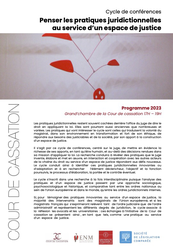conference
🎥Synthèse (Synthesis), in 🧮Les pratiques juridictionnelles au service d'un espace juridique pour le futur (In the Space of Justice, Jurisdictional Practices at the Service of the Future)
pour read cette présentation en français⤴️cliquer sur le drapeau français

🌐follow Marie-Anne Frison-Roche on LinkedIn
🌐subscribe to the Newsletter MAFR Regulation, Compliance, Law
____
► Full Reference: M.-A. Frison-Roche, "Synthèse" ("Synthesis"), in M.-A. Frison-Roche (dir.), Dans l’espace de justice, les pratiques juridictionnelles au service du futur (In the Space of Justice, Jurisdictional Practices at the Service of the Future), in Cour de cassation, cycle of conferences "Penser les pratiques juridictionnelles au service d’un espace de justice" ("Thinking about jurisdictional practices in the service of an area of justice"), 21 November 2024, 4pm.-6pm.
____
🧮see the program of this manifestation (in French)
____
► English summary of this conference: The topic covered takes account of the fact that this scientific event comes almost last in this cycle of conferences Penser les pratiques juridictionnelles au service d’un espace de justice ("Thinking about jurisdictional practices in the service of an area of justice"). Indeed, 'jurisdictional practices' have previously been addressed insofar as they are 'at the service of a European area of justice' (February 2023), enlightened (March 2023), attractive (June 2023), interactive (September 2023), peacemaking (December 2023).
The approach here is different and complementary. The conference's starting point is the observation that, today, many new claims are made before Judges that relate directly to the Future. Admittedly, in their traditional role, Judges deal with the Future of disputed situations, but today it is the Future of Systems in their entirety that is sometimes submitted to them through a dispute or a claim. Moreover, they may be asked to find a systemic solution. The possible presence of future generations is just one sign of this change.
The courtroom may seem unsuitable for trials of such gigantic proportions, both in terms of their subject matter and their impact.
No doubt a distinction must be drawn between judges, some of whom may appear more familiar than others with the systemic issues that the Future brings with itself. Perhaps the judge's prudence should guide him/her in the use they make of their powers when they relate to the future, for example in the handling of sanctions, because the future by its very nature contains an element of the unknown, a fundamental prudence that the principle of the legality of offences and penalties expresses.
But the future is not a blank page and Judges, without inventing it, can, indeed must, monitor the coherence of those who write the legal rules, if they are constitutional judges, and of those who write contracts and commitments, if they are civil and commercial judges. In order to fulfill their role, particularly with regard to the demands of stakeholders, judges need to think about and deal with this new systemic object before them: the future.
To understand it, Judges draw on available jurisdictional practices, adjust others and combine them, using new methods.
____
🧮see below the complete programme of this manifestation⤵️
DANS L'ESPACE DE JUSTICE,
LES PRATIQUES JURIDICTIONNELLES AU SERVICE DU FUTUR
(IN THE SPACE OF JUSTICE, JURISDICTIONAL PRACTICES AT THE SERVICE OF THE FUTURE)
under the scientific direction of Marie-Anne Frison-Roche
21 November 2024, 4pm.-6.30pm.
Court of cassation
Grand'chambre
4pm. Introduction (Introduction), Christophe Soulard, Premier Président de la Cour de cassation (First President of the French Court of cassation)
4.10pm. Le rôle du juge constitutionnel au regard de la durabilité des systèmes et des intérêts des générations futures (The Role of the Constitutional Court with regard to the Sustainability of Systems and Interests of Future Generations), Laurent Fabius, Président du Conseil constitutionnel (President of the French Constitutional Council)
4.30pm. Office du juge constitutionnel et volonté du législateur (décision du tribunal constitutionnel allemand du 24 mars 2021) (Office of the Constitutional Judge and Will of the Legislator (decision of the German Constitutional Court of 24 March 2021)), Andreas L. Paulus, ancien juge au Bundesverfassungsgericht (Tribunal constitutionnel fédéral d’Allemagne), Professeur à l'Université de Göttingen (former judge at the Bundesverfassungsgericht (Federal Constitutional Court of Germany), Professor at the University of Göttingen)
4.50pm. Office du juge pénal sur le futur (Office of the Criminal Judge on the Future), Nicolas Bonnal, Président de la Chambre criminelle de la Cour de cassation (President of the Criminal Chamber of the French Court of cassation)
5.10pm. Les générations futures, nouveaux justiciables (Future generations, new litigants), Sonya Djemni-Wagner, Avocate générale, chargée de mission au cabinet du Procureur général pour les relations internationales, les relations institutionnelles et la recherche (Advocate General, in charge of international relations, institutional relations and research at the Office of the Attorney General to the French Court of cassation)
5.30. Face au futur, la transformation de l’office du juge civil et commercial (Facing the Future, the Transformation of the Office of the Civil and Commercial Judge), François Ancel, Conseiller à la Première Chambre civile de la Cour de cassation (Judge at the First Chamber of the French Court of cassation)
5.50pm. Les cultures juridiques de Civil Law et de Common Law confrontées aux transformations de l’office du juge face au futur (Civil Law and Common Law Legal Cultures confronted with Transformations in the Office of the Judge facing the Future), Catherine Pédamon, Présidente de la section anglaise et galloise de l’Association des Juristes Franco-Britanniques (President of the English and Welsh section of the Association des Juristes Franco-Britanniques)
6.10pm. Synthèse (Synthesis), Marie-Anne Frison-Roche, Professor of Regulatory and Compliance Law, Director of the Journal of Regulation & Compliance (JoRC)
________
comments are disabled for this article